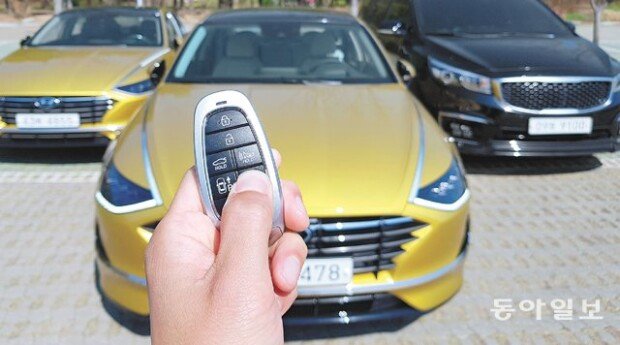Hyundai adds Remote Smart Parking Assist to its new cars
Hyundai adds Remote Smart Parking Assist to its new cars
Posted April. 29, 2019 07:42,
Updated April. 29, 2019 07:42

There was a slot to park a car, but the space was not enough to open the door and get off the car after parking. I got off the car after parking it in front of the parking slot. The car moved into the slot when I pushed the reverse button on the smart key. The car moved back to the original spot when I pushed the start button.
Hyundai Motor’s latest Sonata, which was released last month, offers the “Remote Smart Parking Assist (RSPA).” The car moves and turns the handle for parking or pulling out when the buttons on the smart key are pushed.
After BMW and Mercedes Benz showcased a remote parking feature, Hyundai Motor also adopted RSPA, which does parallel parking, 90 degrees parking and pulling out, at its flagship fuel cell vehicle NEXO, which was released last year. This time, the Korean automaker added a similar feature on its new sonata. “We are trying to resolve social issues and inconveniences coming from the lack of parking space through technology,” said an insider of Hyundai Motor.
Currently, RSPA is being added to one-thirds of new Hyundai cars. “Given the parking condition in Korea, we are planning to expand the feature to more models, including Kia’s new K5 to be released this year,” said a Hyundai Motor Group insider.
The automotive industry anticipates that state-of-the-art technologies will carry out an important role in resolving safety-related social issues such as drowsy or drunk driving as well as parking issues. Those technologies include the one that can shut off the car’s starting system by judging if a driver is drowsy or drunk by recognizing eye blinking or measuring alcohol level.
The European Union has recently made it mandatory for automakers to install a device that locks the wheels of a car if a driver tries to drive under influence from May 2022. The EU is also planning to mandate installation of alert systems to prevent drivers from falling asleep or using mobile phones while driving.
“We already have solutions for issues related to safety, environment and parking,” said automotive engineering professor Kim Pil-soo at Daelim University. “We should actively use technologies that will benefit our society as a whole even though the initial cost could be high.”
Do-Hyong Kim dodo@donga.com







